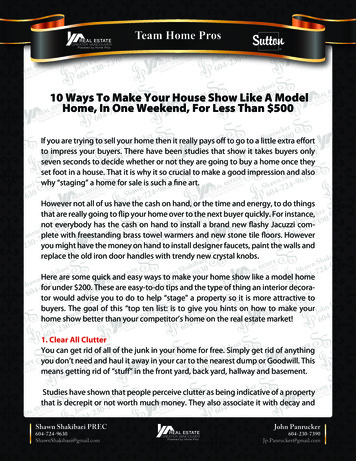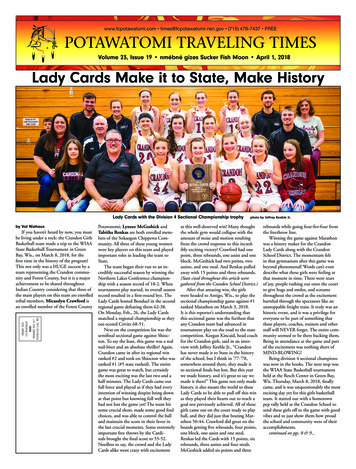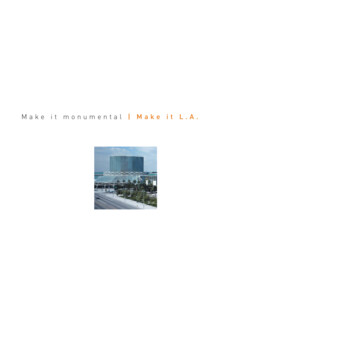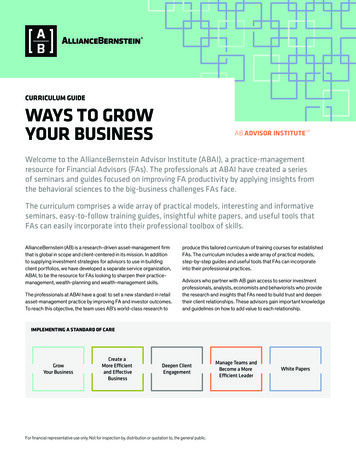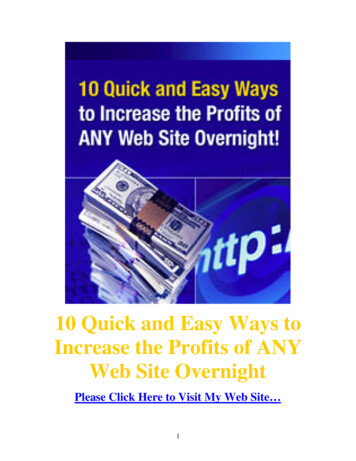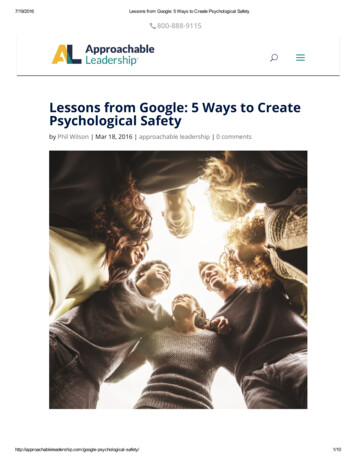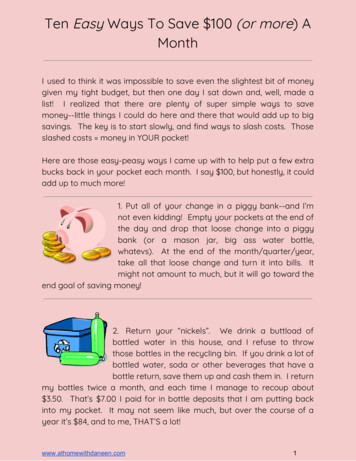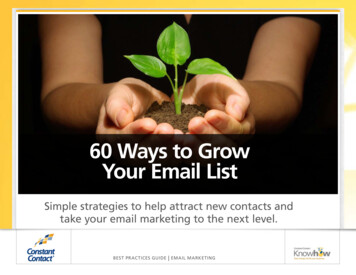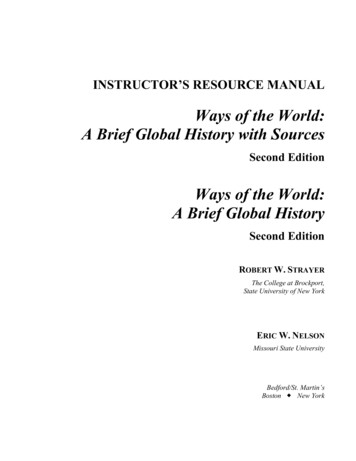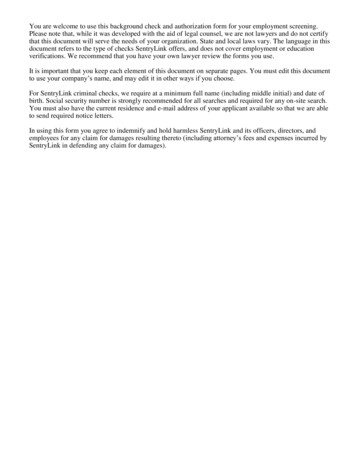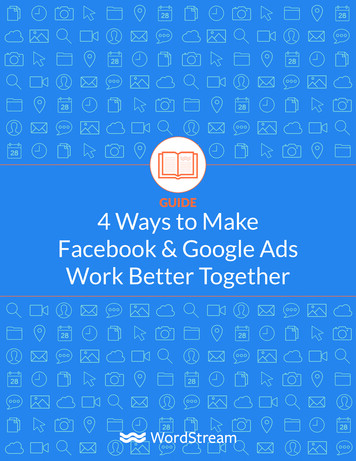
Transcription
GUIDE4 Ways to MakeFacebook & Google AdsWork Better Together4 WAYS TO MAKE FACEBOOK & GOOGLE ADS WORK BETTER TOGETHER1
IntroductionIn many cases, marketers and brands treat their advertising channels as separate forces andmeasure them one against another, to see which brings them the best results. In most cases, it’sGoogle vs. Facebook. But actually, there’s a better way to look at it.Instead of thinking about it as Google versus Facebook, try to think in terms of Google PLUSFacebook.Each of these major marketing channels has its own advantages and disadvantages, but whentreated as one super-mega-major marketing force, they become even more powerful than asseparated channels, and can definitely get you superior marketing results (especially if yourcompetitors stick to the “vs” approach).The secret is, to fully use the power of each of these channels, and let each channel help the other.Here are a few ways to get started.1. Provoke brand searches withFacebook, close the deal with GoogleA well-targeted campaign on Facebook will not only get you excellent results by reaching andconverting a cold audience, it can also increase the number of people searching for your brandname on Google. When this happens, you get a golden opportunity to “close the deal” when theyare trying to inquire about your brand and learn some more, after seeing your ad on Facebook.You will be surprised by the number of people who will go directly to Google and search for yourbrand name after seeing an ad on Facebook, instead of directly clicking it.4 WAYS TO MAKE FACEBOOK & GOOGLE ADS WORK BETTER TOGETHER2
Cross-Network Ads Lift BrandedSearch Interest on Google!Google Branded Search Interest140%130%120%26%110%31%34%100%90%80%Only Google Search Google Search &Bing AdsGoogle Search &DisplayGoogle Search &Facebook AdsWordStream found that advertising on Facebook led to a 34% increase in brand searches onGoogle.There’s actually a very simple explanation for this. Many of the people that see your Facebook adsmay have some interest in the offer, but they want to know more about your company and whatyou sell. Therefore, instead of clicking the ad, they will leave Facebook and search for your brandname to get the information they want.All you have to do is use your brand name as a keyword in your search campaigns, and matchthe messaging to your current Facebook ads. Doing so will lead your cold audience on Facebookto find exactly what they were looking for on Google. It strengthens your marketing message andshows reliability.I guess that by now you might be asking yourself, “Why should I use my brand name as a keywordwhen my website is already ranked first on Google for it?” Well, the answer to that is very simple.Targeting your brand name as a keyword allows you to better test your messaging in terms of CTRand conversions, and match it to what you’re saying about yourself in your Facebook ads.Here’s an example from a live test, doing exactly what’s described above. This is a Facebook adtargeting a completely cold audience, containing people who are most likely never heard of thisbrand.4 WAYS TO MAKE FACEBOOK & GOOGLE ADS WORK BETTER TOGETHER3
And here’s a matching ad on Google, with matching messaging, just waiting for those Facebookusers to come in.So to summarize, easily reach a broad, cold audience on Facebook, and close the deal in Googlewhen they’re searching for your brand name.2. Target your Facebook ad headlinesas keywordsThis one is actually pretty simple, and takes what we explained about using your brand name as akeyword to the next level.4 WAYS TO MAKE FACEBOOK & GOOGLE ADS WORK BETTER TOGETHER4
As mentioned above, a successful ad campaign on Facebook can easily reach many prospects andgenerate a lot of brand searches on Google, but when done right, it’s not only the brand namepeople will be searching for, it’s also your ad headlines.A catchy headline can be more memorable than a brand name and generate more directsearches.While it may sound surprising it actually makes a lot of sense. A good headline like “Turn invoicesinto cash,” as seen in the image below, can be much more memorable than the actual brandname, and make the people who saw it search for it when they’re looking for more information.This ad by Fundbox really made people actually go on Google and search for the terms: “turn invoices into cash” “turn invoices into cash company” “invoice to cash”And many more related search terms.The title is so catchy, and right to the point, it provoked many searches and led to a lot of easyconversions. All Fundbox did here was directly “answer” the search term and show great reliabilityto the users who were just looking for some more information about that interesting ad they sawon Facebook.4 WAYS TO MAKE FACEBOOK & GOOGLE ADS WORK BETTER TOGETHER5
3. Retarget your searching users withwhat they were searching forSo in sections 1 and 2, we did a kind of retargeting on Google, to the cold audience from Facebook.It was done regardless of whether the ad was clicked on or not. By using actual retargeting, wecan take the connection between Facebook and Google even further, and make it much morepowerful.If you are managing campaigns on Facebook and Google, you are probably already aware of theimportance of retargeting (If not, you should get aware to it ASAP). But actually, there’s much moreto retargeting than just displaying the same ads to all your past visitors, and one of the best waysto use retargeting is cross-platform.Cross-platform retargeting means to retarget the users who got to your site from Google onFacebook, and the other way around. But, there’s a clever way to do it even more efficiently.You can use Facebook to retarget the people who got to your website from a search ad,with exactly what they were searching for.This one may sound a bit tricky, but it’s actually quite simple. Here’s a great example of this tacticin action. For example, the ad below was displayed to people who were searching for “eBaytemplates” on Google:4 WAYS TO MAKE FACEBOOK & GOOGLE ADS WORK BETTER TOGETHER6
It’s actually very easy to do (assuming you are using unique landing pages, and don’t sendeveryone to your homepage). To make sure you’re displaying the right “answer” ad to the rightpeople, you will need to segment your custom audiences on Facebook. Simply go to the audiencetab, and create a custom audience that matches exactly the right landing page which the ad onGoogle leads to. So, here’s how it works in our example:All I did was segment my audience by people who reached the site through the source “AdWords”,to the landing page about templates.And there you go. You can now use Facebook retargeting to reach the people who clicked on yoursearch ads, with exactly what they were searching for.4 WAYS TO MAKE FACEBOOK & GOOGLE ADS WORK BETTER TOGETHER7
4. Find more people similar to yoursearching usersThe power of lookalikes targeting on Facebook is absolutely insane, and I won’t go on and on aboutit in this post, because that’s a bigger subject. So, if you are not familiar with it, I suggest you getright to it.If you are familiar and using lookalike audiences in your Facebook campaigns, here’s a nice trickyou can use: Create lookalikes audiences based on what your site visitors were searching for.You probably know the best practice about lookalikes, which is to use your top users or customersas a seed and base your lookalike audiences on that. Well, that’s definitely true, but there’s moreyou can do.In many cases, you will probably find yourself struggling with creating a high-quality seed sinceyou need a high number of very homogenous audience members. In other cases, you’ll see goodresults with your top lookalikes, but wish to expand further (which is mostly the case, especially foradvertisers with big budgets).So what to do? Create a lookalike audience based on your site visitors from search campaigns. Bydoing so, you’ll be able to reach more people who are similar to the people who were searching forwhat you are offering.4 WAYS TO MAKE FACEBOOK & GOOGLE ADS WORK BETTER TOGETHER8
You may be wondering, why target people that are similar to my searching users, but maybe didnot convert? Easy: Just because you did not convert the people who clicked your ads on Google,doesn’t mean you will not convert their lookalikes.But be careful with it. Some of the people in this lookalike audience might also be a part of yourregular lookalikes audience, so you need to make sure you will not target them twice in twodifferent ad sets.Make sure to exclude your lookalikes based on customers from your search-based lookalikeaudiences.Final wordsLooking at the bigger picture and changing my approach from “Google vs. Facebook” to “Googleplus Facebook” has definitely improved my overall results. From my experience, it helps you seethe bigger picture and strategize better.ABOUT WORDSTREAMWordStream, Inc. provides software and services that help marketers get the maximum results from their onlinemarketing efforts. WordStream’s easy-to-use software allows for more effective paid search and social campaignswith the 20-Minute Work Week, a customized workflow that guides marketers through steps that can greatly improvetheir AdWords, Bing, Yahoo, and Facebook campaigns, plus tools for call tracking, keyword optimization, and more.WordStream also offers an award-winning free PPC tool, the AdWords Performance Grader, which evaluates users’Google AdWords accounts and provides valuable tips for improvement. WordStream is a Google Premier Partner.4 WAYS TO MAKE FACEBOOK & GOOGLE ADS WORK BETTER TOGETHER9
STOP WASTINGMONEY IN ADWORDSGet actionable advice on how to improve your account nowwith WordStream’s FREE AdWords Performance Grader.GRADE YOUR ACCOUNTwww.wordstream.com/google-adwords4 WAYS TO MAKE FACEBOOK & GOOGLE ADS WORK BETTER TOGETHER10
Oct 04, 2018 · WordStream found that advertising on Facebook led to a 34% increase in brand searches on Google. There’s actually a very simple explanation for this. Many of the people that see your Facebook ad
